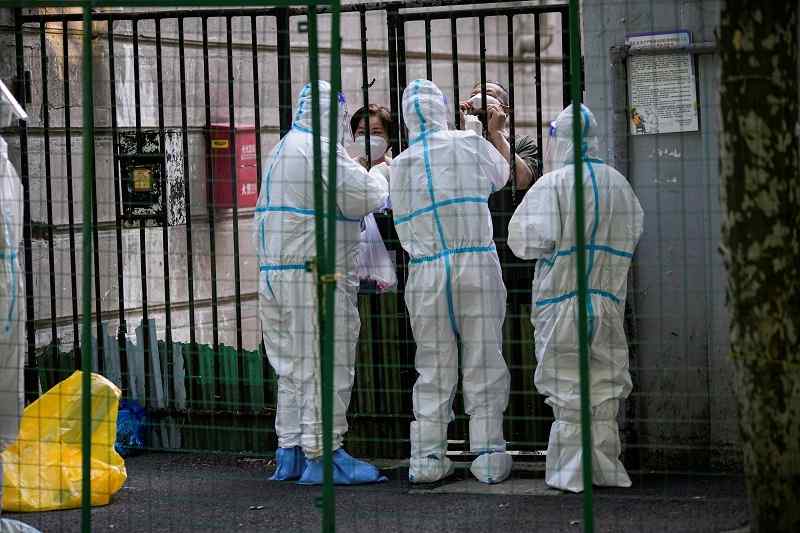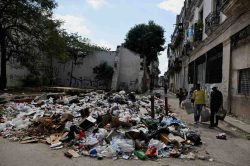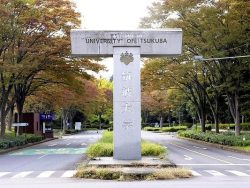
A resident gets tested for the coronavirus disease (COVID-19) behind barriers of a sealed area, after the lockdown placed to curb the COVID-19 outbreak was lifted in Shanghai, China, June 8, 2022.
13:21 JST, June 9, 2022
SHANGHAI (Reuters) – Parts of Shanghai began imposing new lockdown restrictions on Thursday, with residents of sprawling Minhang district ordered to stay home for two days in a bid to control COVID-19 transmission risks.
Minhang, home to more than 2 million people, will conduct nucleic acid tests for all residents on June 11, and restrictions will be lifted once the testing is completed, the government said on its WeChat account.
Shanghai reported four new confirmed symptomatic COVID-19 cases on Wednesday, all in zones already under quarantine. None of the new cases were in Minhang district.
Shanghai emerged from a two-month city-wide lockdown last week, but some residential compounds have been sealed off again as authorities continue to pursue a “dynamic zero-COVID” policy aimed at shutting down transmission chains as soon as possible.
This means that authorities quickly enforce movement curbs and testing requirements in areas where not only positive cases, but also their close contacts, live or have visited.
Several street-level government authorities have issued notices saying residents will be subject to two days of confinement and another 12 days of rigorous testing starting from Thursday.
According to notices from at least three neighborhoods in Shanghai, residents will be subject to five rounds of compulsory tests ending on June 23, and will be kept indoors until Saturday.
Green fences and red wooden boards have sprung up over the past week along some of these streets close to these neighborhoods, barricading residents in and triggering fresh public anger.
Zhao Dandan, the vice-head of Shanghai’s health commission, told a briefing on Tuesday that the city would continue to implement restrictions even in areas that had not been identified as “high risk.”
“Based on the assessment of the epidemic prevention and control trends, related measures will be adjusted dynamically,” he said. “We hope the public will continue to understand and cooperate.”
City authorities have been trying to balance their adherance to zero-COVID with encouraging business resumption, given how badly the local economy and companies were hit by the two-month long lockdown.
The Shanghai Disney Resort, which has been shut since March 21, said it will reopen some retail and park areas from Friday but the main Disneyland park, Disneytown and its two resort hotels will remain closed until further notice.
Officials in the city, China’s most cosmopolitan and its biggest business hub, have also been trying to mend ties with foreign firms by holding multiple meetings with executives and easing a key border requirement for overseas workers.
Still, business chambers said uncertainty surrounding COVID-19 restrictions remained a key concern for foreign firms.
“This unpredictability, and increased risk, is resulting in many businesses delaying, reducing or withdrawing entirely from the Chinese market,” said Alexandra Hirst, senior policy analyst with the British Chamber of Commerce in China.
Top Articles in News Services
-

Prudential Life Expected to Face Inspection over Fraud
-

Hong Kong Ex-Publisher Jimmy Lai’s Sentence Raises International Outcry as China Defends It
-

Japan’s Nikkei Stock Average Touches 58,000 as Yen, Jgbs Rally on Election Fallout (UPDATE 1)
-

Trump Names Former Federal Reserve Governor Warsh as the Next Fed Chair, Replacing Powell
-

Suzuki Overtakes Nissan as Japan’s Third‑Largest Automaker in 2025
JN ACCESS RANKING
-

Japan Institute to Use Domestic Commercial Optical Lattice Clock to Set Japan Standard Time
-

Israeli Ambassador to Japan Speaks about Japan’s Role in the Reconstruction of Gaza
-

Man Infected with Measles May Have Come in Contact with Many People in Tokyo, Went to Store, Restaurant Around When Symptoms Emerged
-

Prudential Life Insurance Plans to Fully Compensate for Damages Caused by Fraudulent Actions Without Waiting for Third-Party Committee Review
-

Woman with Measles Visited Hospital in Tokyo Multiple Times Before Being Diagnosed with Disease























